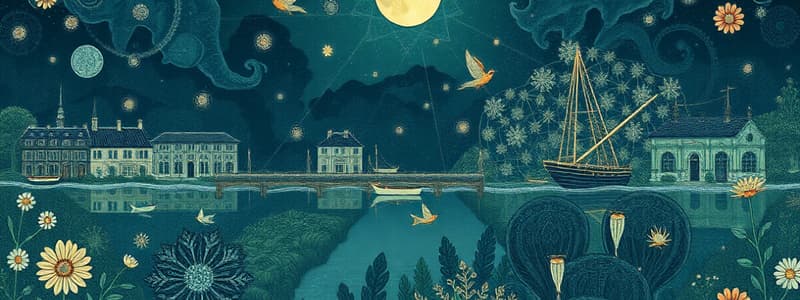Podcast
Questions and Answers
What term describes all the water on Earth?
What term describes all the water on Earth?
- Biosphere
- Hydrosphere (correct)
- Lithosphere
- Atmosphere
What type of water source is an ocean considered to be?
What type of water source is an ocean considered to be?
- Brackish water
- Groundwater
- Seawater (correct)
- Freshwater
Which process involves water entering the atmosphere?
Which process involves water entering the atmosphere?
- Infiltration
- Precipitation
- Evaporation (correct)
- Condensation
How do estuaries differ from freshwater bodies in terms of salinity?
How do estuaries differ from freshwater bodies in terms of salinity?
Which phase of the water cycle is associated with the formation of clouds?
Which phase of the water cycle is associated with the formation of clouds?
What is an example of freshwater?
What is an example of freshwater?
What type of precipitation includes rain, snow, or sleet?
What type of precipitation includes rain, snow, or sleet?
Which of the following correctly defines the water source of a pond?
Which of the following correctly defines the water source of a pond?
What role does evaporation play in the water cycle?
What role does evaporation play in the water cycle?
Which type of water is characterized by a higher salt content?
Which type of water is characterized by a higher salt content?
What is the primary source of water for streams?
What is the primary source of water for streams?
Which of these processes removes water from the surface of the Earth and adds it to the atmosphere?
Which of these processes removes water from the surface of the Earth and adds it to the atmosphere?
Which of the following is NOT a source of freshwater?
Which of the following is NOT a source of freshwater?
What is the role of condensation in the water cycle?
What is the role of condensation in the water cycle?
Which of these is an example of a freshwater source?
Which of these is an example of a freshwater source?
Estuaries are unique environments with unique characteristics. Which statement accurately describes estuaries?
Estuaries are unique environments with unique characteristics. Which statement accurately describes estuaries?
Why is the water cycle considered a continuous process?
Why is the water cycle considered a continuous process?
Which statement correctly describes the hydrosphere?
Which statement correctly describes the hydrosphere?
Which of the following is NOT a factor that influences the water cycle?
Which of the following is NOT a factor that influences the water cycle?
What is the primary characteristic that distinguishes a lake from a pond?
What is the primary characteristic that distinguishes a lake from a pond?
Flashcards
Evaporation
Evaporation
A process where liquid water changes into water vapor and rises into the atmosphere.
Water Cycle
Water Cycle
The continuous movement of water on, above, and below the surface of the Earth.
Ocean
Ocean
A large body of saltwater, such as the Pacific Ocean or the Atlantic Ocean.
Groundwater
Groundwater
Signup and view all the flashcards
Estuary
Estuary
Signup and view all the flashcards
Cloud
Cloud
Signup and view all the flashcards
Freshwater
Freshwater
Signup and view all the flashcards
Hydrosphere
Hydrosphere
Signup and view all the flashcards
Precipitation
Precipitation
Signup and view all the flashcards
Condensation
Condensation
Signup and view all the flashcards
Water Vapor
Water Vapor
Signup and view all the flashcards
Seawater
Seawater
Signup and view all the flashcards
Why is evaporation crucial?
Why is evaporation crucial?
Signup and view all the flashcards
Freshwater vs. Seawater
Freshwater vs. Seawater
Signup and view all the flashcards
Study Notes
Earth's Water Systems Study Notes
-
Oceans: Saltwater sources.
-
Streams: Primarily freshwater sources.
-
Evaporation: A crucial process for water entering the atmosphere.
-
Estuaries: A mix of fresh and saltwater.
-
Lakes: Typically freshwater.
-
Clouds: Made of water vapor in the atmosphere.
-
Groundwater: Classified as freshwater.
-
Water Cycle: Involves evaporation, condensation, and precipitation; ensures water availability.
-
Hydrosphere: Encompasses all water sources on Earth.
-
Ponds: Freshwater sources.
Water Cycle Concepts
- Evaporation: Water changes from liquid to gas and enters the atmosphere.
- Condensation: Water vapor cools and changes back into liquid form, forming clouds.
- Precipitation: Water falls from the atmosphere as rain, snow, sleet, or hail.
Water Sources and Their Characteristics
- Freshwater: Sources like streams, lakes, rivers, and groundwater. Lower salt content.
- Saltwater: Sources like oceans and seas. High salt content.
- Estuaries: Region where fresh and saltwater mix.
Key Differences Between Water Sources
- Oceans vs. Lakes/Streams: Oceans contain saltwater, lakes and streams primarily freshwater.
- Estuaries vs. Lakes/Oceans: Estuaries mix fresh and saltwater; lakes and oceans are predominantly one or the other.
Studying That Suits You
Use AI to generate personalized quizzes and flashcards to suit your learning preferences.



